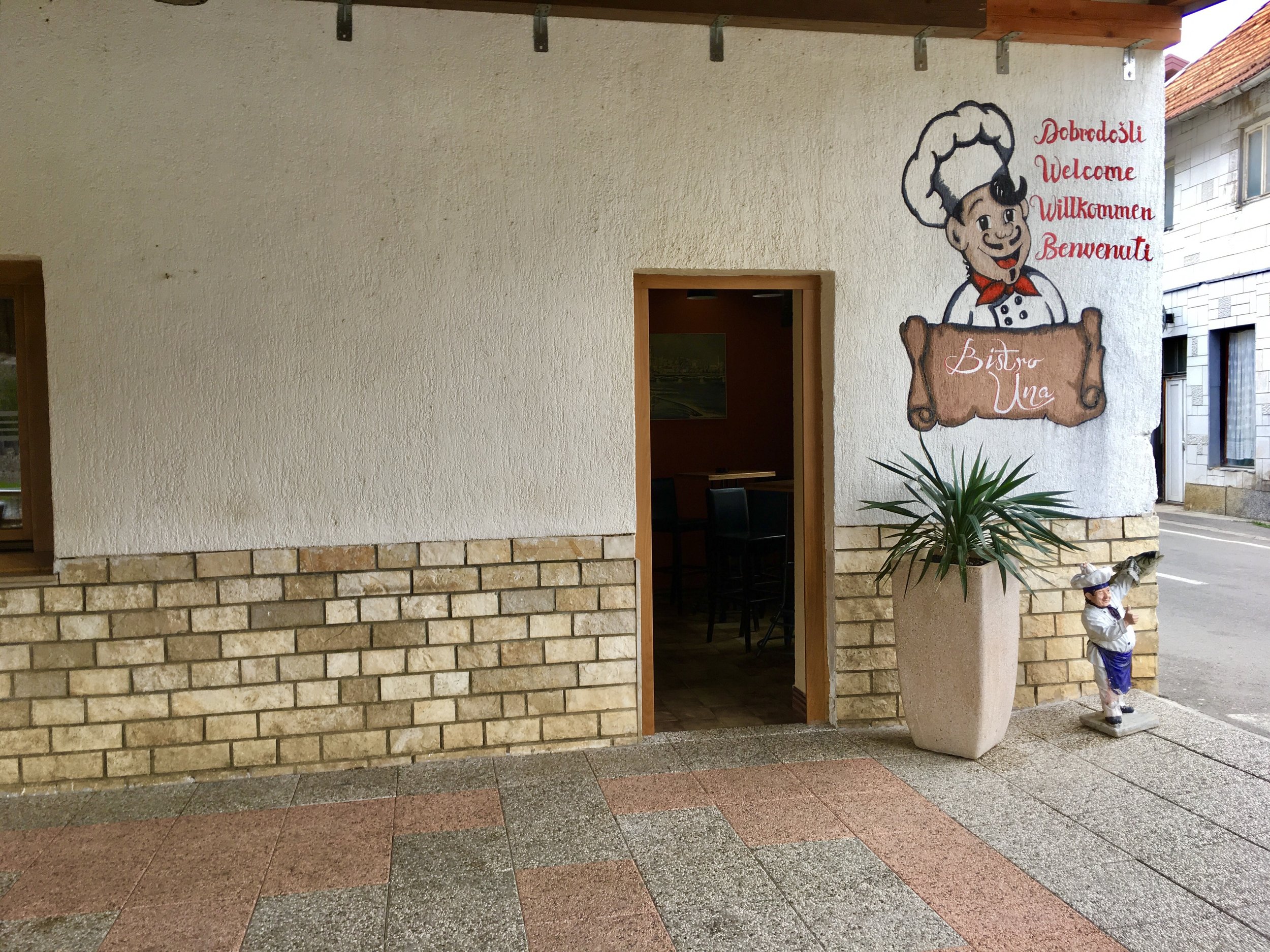Kulen Vakuf // That Schopenhauer Quote About Happiness
© Veronika Kovalenko // Shutterstock.com
Imagine living in Una National Park. What could be better? If that were the case, every morning coffee would be accentuated with the glimmer of Bosnia and Herzegovina’s most beautiful river, its verdant companions and the tender embrace of Mother Nature herself. Every afternoon would come wrapped up in glittering serenity. You’d probably sleep like the allegorical baby as opposed to actual babies.
There aren’t many options for living in Una National Park. The largest settlement within this glorious celebration of nature is home to less than 500 people, although locals will claim larger numbers. That might be true in summer when the place is buzzing with tourism, but the opposite will come to fruition in the winter. I’ve never been to a ghost town, not believing in ghosts and all that (despite seeing a ghost when I was a child, a ghost smashing a button making Ric Flair’s “woo!” noise), but Kulen Vakuf in the winter more than likely fits the bill.
That’s just the thing. There are ghosts here. In a little over 400 years of tangible history, Kulen Vakuf has been destroyed several times, be it in the perpetual wars fought between the Austrian and Ottoman Empires or the bitter one contested between the ideologies of World War II. Heck, even God had a go, burning Kulen Vakuf to ashes in 1903.
What contrasting paragraphs we have here! Tickling all levels of life, from the eternal optimism given to us by the majesty of the world around us to the crushing disappointment of human behaviour within it. Kulen Vakuf isn’t the sort of place for whistful philosophy, it isn’t the place for pretentious forays into sentimentality. Nothing profound is coming from these fingers, and it certainly isn’t happening in Kulen Vakuf. It is difficult to find happiness in yourself, and impossible to find it anywhere else.
Because Kulen Vakuf is interested only in the beauty of its meagre streets, the lyrical nature of its mosque, the magic of the river. This is Una National Park, if you’re expecting anything other than the Una to take centre stage then you are fooling yourself. I don’t have the words for the Una. I’ll try, but I will fail. My arms are too short to box with God, if you’ll allow me to shoehorn that reference in.
© John Bills
A small town slash village built on the banks of the Una, Kulen Vakuf has long been a hub of human activity, from the days of the Romans to modern tourism. There was once a road from Zadar to here, offering respite and trade for merchants travelling from the coast to bigger centres inland. The Ottomans established a town proper, doing so under the reign of Sultan Ahmed I, the first Sultan not to execute his brothers upon taking charge. Ahmed commissioned the building of a mosque here, more than one, but only one remains. It has been destroyed over the years, but giving more words to destruction is a fool’s game.
Besides, the mosque stands today, and it is a mighty curious one. It might not look so from afar, offering up the standard (yet stunning) minaret, but get closer, and you’ll see that the Sultan Ahmed Mosque is different. For one, you need to climb stone steps to enter the place. Below the mosque is a corridor of shops and offices, a bustling collection of modern existence that keeps Kulen Vakuf ticking over in the modern age. The mosque was constructed between 1603 and 1613, and its curiosity is the slightest of windows into Kulen Vakuf’s historical importance.
After all, Kulen Vakuf was the birthplace of Bosnia and Herzegovina’s first reis-ul-ulema (Grand Mufti, although do correct me if I’m wrong there. You are my guide). Mustafa Hilmi Hadžiomerović was born in 1816 and spent his early years in the town, moving up the ladder of education and getting a basic grounding in religious understanding before going to high school in Prijedor and on to further education in Sarajevo. Hadžiomerović was appointed reis-ul-ulema in 1882 and set about trying to convince Bosnian Muslims to stay in their homeland, as the fear of what the Austrians might bring took hold.
By that point, Bosnia and Herzegovina was under de facto control of Austria-Hungary, setting in motion a series of events that eventually led to Gavrilo Princip, a sandwich, a cup of coffee, Archduke Franz Ferdinand and around 40 million dead. That isn’t to say that the Ottoman centuries were peaceful, because they weren’t. The town’s most famous son, after all, was an Ottoman noble-come-Kapetan who developed a reputation for scrapping that led to his own downfall.
© John Bills
That man was Mehmed-beg Kulenović. The son of Hadži-Ibrahim-beg Kulenović, Mehmed inherited the titles of his father when the old man popped it. That was no small fry, as the Kulenović were one of the most powerful Bosnian Muslim aristocratic families of the time, and Mehmed set about making his mark. He was all sorts of active, building towns and structures and all the rest, but he was mostly active on the battlefield. His enthusiasm for war led him to take part in an attempt to quash the First Serbian Uprising, eventually winning a duel but being ambushed in the aftermath.
For such a peaceful place, the history of Kulen Vakuf sure does doff its cap to violence. A fortress called Ostrovica is nearby, built by a Croatian nobleman called Mikuličić, but all that remains is, well, remains. The Ottomans called Kulen Vakuf Džisr-i-kebir, which loosely translates as ‘Great Bridge’, but the bridge in question has been felled many times. Kulen Vakuf is defined by its relationship with the beautiful Una, but that has brought plenty of tumult.
You wouldn’t guess it today. I nursed an espresso and returned my attention to the river, a river beyond my descriptive capabilities as a writer and as a man.


